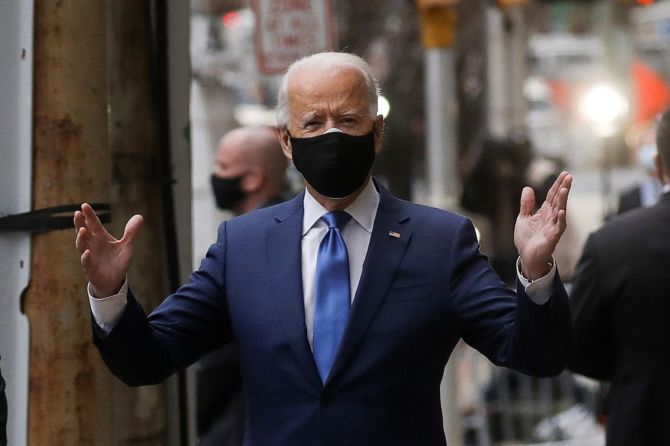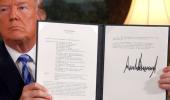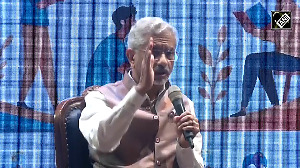The reversal of Trump's policy with regard to Iran, like the withdrawal from the Paris Agreement, may not be a matter of just turning the clock back, but one of patient negotiations, with uncertain consequences in the post-COVID-19 world, observes Ambassador T P Sreenivasan.

Within days after the US elections, long before the victory of Joe Biden and Kamala Harris became clear, the discussion in the corridors of the IAEA Board of Governors in Vienna was on the possibility of reviving the Joint Comprehensive Plan of Action -- JCPOA -- if the US is ready to join.
The general consensus, reinforced by a remark by an IAEA official, was that there will be 'no linear return to the 2015 agreement' even when the US returns.
JCPOA was likened to Humpty Dumpty, who had a great fall after which all the king's horses and all the king's men could not put him together again.
The situation on the ground in the US, Iran and the Middle East had changed so much that a simple turning back of the clock was not possible.
International agreements are reached at a particular moment in history when diverse interests coincide and so they cannot be transplanted to a different time and circumstance, even if the parties are the same.
The immediate question will be the compensation for the billions of dollars Iran had lost on account of the re-imposed sanctions.
The US or the Europeans will not be ready to pay any compensation, particularly as Iran had continued to breach the JCPOA limits on enrichment levels and acquisition of stockpiles and centrifuges.
The Europe's intransigence over banking transactions and oil purchases will be another hurdle.
Not anticipating a Biden victory, Iran had done everything possible to hasten its move to acquire nuclear weapons.
Reversing that process will be opposed by the hardliners in Iran, partly because of the perception that the US is moving towards the left.
Iran's parliament recently passed a bill, though not a law yet, that requires the Atomic Energy OrganiSation of Iran to significantly increase enrichment and stop voluntary implementation of the Additional Protocol (AP).
The bill also suspends IAEA access to facilities that are covered in JCPOA, but not in the AP, such as uranium mines and centrifuge rotor factories.
The Iranian Presidential elections are due next June and that reduces the window of opportunity for the US to get the negotiations started, because, if the hardliners win, the work done will be abandoned.
Iranian Foreign Minister Mohammad Javad Zarif has raised doubts about prospects for a follow-on agreement, especially one that would extend the JCPOA.
'We don't renegotiate what we've already negotiated,' he said during an interview at the Council of Foreign Relations in September.
But more recently he said that if the US implements UN Security Council Resolution 2231 endorsing the JCPOA the sanctions would be removed and that Iran 'will resume honouring its commitments under the JCPOA.'
'Thus, first, if the US meets its commitments under Resolution 2231, we will fulfil ours under the JCPOA.'
'Second, if the US seeks to join the JCPOA again, we are ready to negotiate the terms and conditions of Washington's membership in the deal." He sounded positive, but the intricacies were evident.
Thomas L Friedman wrote in a New York Times column on December 2, 2020 after a conversation with Biden: 'The view of Biden and his national security team is that once the deal is restored by both sides, there will have to be, in very short order, a round of negotiations to seek to lengthen the duration of the restrictions on Iran's production of fissile material that could be used to make a bomb -- originally 15 years -- as well as to address Iran's malign regional activities, through its proxies in Lebanon, Iraq, Syria and Yemen.'
'Ideally, the Biden team would like to see that follow-on negotiation include not only the original signatories to the deal -- Iran, the United States, Russia, China, Britain, France, Germany and the European Union -- but also Iran's Arab neighbors, particularly Saudi Arabia and the United Arab Emirates.'
Given the situation today, Biden will have to be content with restoring JCPOA for 15 years.
The rest of his agenda will be hard to accomplish in the short run.
Biden will face constraints both domestically and internationally on how much he can offer.
Democrats were not uniformly supportive of JCPOA in 2015.
With Israel normalising relations with the UAE and getting closer to Saudi Arabia, there will be pressure from them on Biden not to make concessions to Iran unless Iran's missile programme and its effort to dominate the region can be curbed.
Saudi Arabia is renewing threats of developing its own nuclear weapons if Iran can't be prevented from making its own.
The UAE also wants to be a part of the negotiation on the JCPOA, citing its nuclear cooperation agreement with the US under which it promised to permanently forgo uranium enrichment and spent fuel reprocessing.
European officials are generally willing to revive the JCPOA.
Yet Europeans are concerned that ongoing nuclear research and development work in Iran is not reversible and that Iran is moving more and more away from the agreement.
They are also concerned about the IAEA's report made to the Board of Governors that it had discovered 'isotopically altered particles' of enriched uranium, and that Iran's explanation of their origins 'was not technically credible.
Iran is also reported to have stockpiled twelve times more uranium than in 2016.
After Trump withdrew from JCPOA, Iran's stockpile is 2442.9 kg as against the authorised 202.8kg under the JCPOA.

In November 2020, the Board of Governors of the IAEA heard a report from the director general of the agency of his findings about the detection of chemically processed uranium particles at an undeclared location in Iran.
After interacting with Iran for more than two years, the director general reported that Iran's responses remained 'unsatisfactory' and 'not technically credible'.
The report also noted that Iran's 'not technically credible' explanations relate to 'the presence, at the location in Iran not declared to the Agency, of isotopically altered particles of low enriched uranium, with a detectable presence of Uranium 236.'
The US governor stated, 'No one should mistake what is being conveyed here: Whatever nuclear material left such traces was very likely enriched or irradiated. This raises a whole new series of questions about where such material came from and what Iran may still be hiding.'
The assassination of Mohsen Fakhrizadeh, who formerly headed an undeclared Iranian nuclear weapons effort known as the Amad Plan, was placed at Israel's door as an effort to derail attempts by the incoming Biden administration to rescue the Iran nuclear deal.
But a member of the country's Supreme National Security Council, said the attackers 'used electronic equipment' and that 'no individual was present at the site'.
The suggestion of a remote hit contrasts sharply with earlier Iranian reports suggesting that Fakhrizadeh was ambushed as he was driving.
Fakhrizadeh's death may be unrelated to JCPOA and it may not be as provocative as it appeared earlier.
The reversal of Trump's policy with regard to Iran, like the withdrawal from the Paris Agreement, may not be a matter of just turning the clock back, but one of patient negotiations, with uncertain consequences in the post-COVID-19 world.
Ambassador T P Sreenivasan (IFS 1967) is a former Ambassador of India and Governor for India of the IAEA.
A frequent contributor to Rediff.com, you can read his fascinating columns here.
Feature Presentation: Aslam Hunani/Rediff.com











 © 2025
© 2025